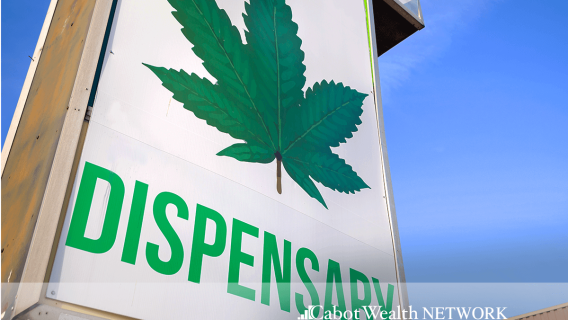As the presidential election contest heats up, investors are laser-focused on the role of cannabis reforms in the contest.
The big one is rescheduling of cannabis under the Controlled Substances Act (CSA) being pushed by the administration of President Joe Biden to shore up the youth vote.
Polls show younger voters overwhelmingly support legalization. Rescheduling would give cannabis companies a fresh shot of cash by allowing them to deduct operating expenses on federal tax forms.
But ongoing state-level developments are probably more important for cannabis investors – for two reasons. Progress on the legalization of recreational-use sales in at least three big states will boost revenue. The change will also increase pressure on representatives in Congress and the administration to notch wins on cannabis reform.
[text_ad]
Here’s a look at three key state developments that could support cannabis stocks with some of the biggest exposure to these regional developments like Trulieve (TCNNF), Curaleaf (CURLF), and Verano (VRNOF), and other names in the AdvisorShares Pure U.S. Cannabis (MSOS), one of my favorite exchange-traded funds in the space.
3 State-Level Cannabis Initiatives
1. Floridians may soon green-light recreational-use sales
Florida voters get to decide on legalizing recreational-use sales in a November referendum. Over 60% of voters need to approve the measure for it to become law. Polls suggest the vote will be close. However, that could soon change given the firepower of the lobbying group supporting the legalization of recreational-use cannabis sales in Florida.
Approval would boost cannabis stocks considerably because of the potential size of the Florida market. Trulieve CEO Kim Rivers estimates the Florida market could grow to $6 billion in annual sales, one of the biggest markets in the world. In contrast, analysts expect the state to book about $2 million in medical cannabis sales this year.
The state has 22 million residents and 138 million annual tourist visits. A positive vote would also confirm the cultural shift in the U.S. towards cannabis legalization, which puts pressure on politicians to support federal-level cannabis reform.
The lobbying group supporting the legalization of recreational-use cannabis sales in Florida has raised a massive war chest of over $40 million. Known as Smart & Safe Florida, the group will use the money to try to persuade voters to approve a November referendum that calls for the legalization of rec-use cannabis sales. Not surprisingly, the lobbying group is supported mostly by cannabis companies that stand to benefit because of their big presence in Florida, in particular, Trulieve.
Reformers face some powerful opponents. A lobbying group called the Florida Freedom Fund created by Florida Gov. Ron DeSantis (R) will challenge the measure to legalize rec-use sales. The Florida Republican Party also opposes legalization of rec-use sales. A nonpartisan group called Florida Financial Impact Estimating Conference has said legalization of rec-use sales would generate $196 million to $431 million a year in state and local taxes.
2. The Ohio cannabis market is about to take off
Ohio regulators recently approved over five dozen licenses that allow medical cannabis companies to move into recreational-use sales. The move signals that recreational-use sales are about to take off in a big way. Voters approved rec-use sales in a referendum last November. Truelieve CEO Rivers estimates this market can reach $2 billion in annual sales, compared to under $500 million in medical-use sales last year.
3. Pennsylvania may be the next state to go recreational
The Ohio developments turn up the heat on neighboring Pennsylvania to legalize rec-use sales. Facing pressure in the form of tax revenue lost to surrounding states that have approved recreational-use cannabis sales, a group of Pennsylvania lawmakers say they have drummed up enough support to advance a bill to legalize rec-use cannabis in the Keystone state. Reps. Aaron Kaufer (R), Emily Kinkead (D), and Sen. Sharif Street (D) made the comments at a recent press conference.
“It’s time for us to move these bills,” said Street. “It’s time for the House and Senate to move together. We now have bills that aren’t too far apart in both chambers.” A recent study suggested that Pennsylvania would see up to $2.8 billion in rec-use sales in the first year of legalization, generate as much as $720 million in tax revenue and create upwards of 45,000 jobs. Gov. Josh Shapiro (D) supports legalization. Pennsylvania already allows medical use sales.
The timeline here is murkier. But given the ongoing loss in tax revenue to neighboring states, it’s not unreasonable to expect Pennsylvania to flip inside a year.
[author_ad]
Michael Brush is Chief Analyst of Cabot Cannabis Investor. Brush is an award-winning New York-based financial journalist who also writes a stock market column for MarketWatch. He has also covered business and investing for the New York Times, the Economist Group and MSN Money. Brush studied at Columbia Business School in the Knight-Bagehot Fellowship program, and Johns Hopkins SAIS in Italy. He is the author of Lessons From the Front Line, a book offering insights on investing and the markets based on the experiences of professional money managers (published by John Wiley).

